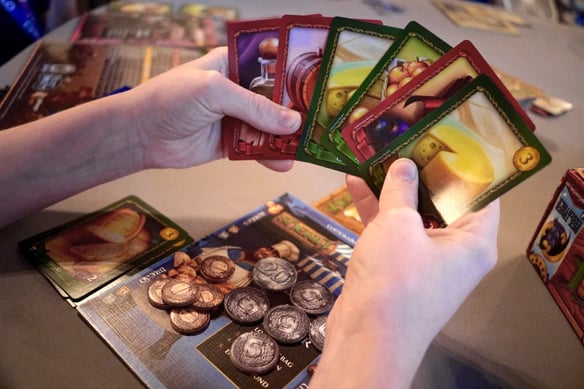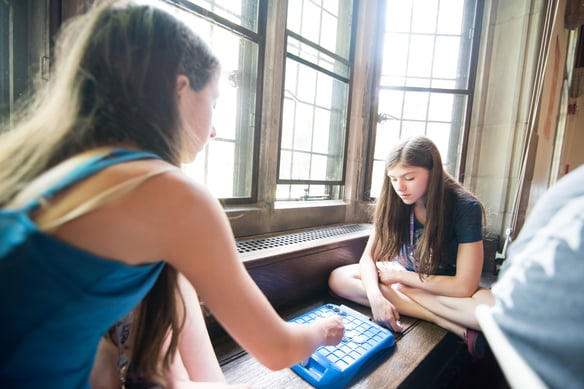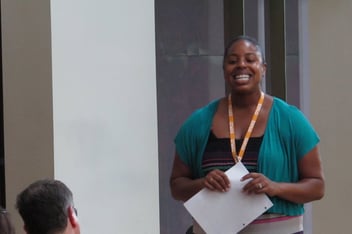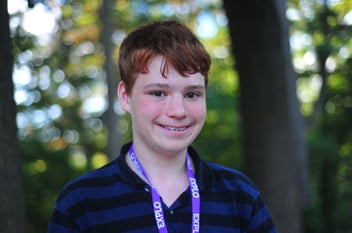Building Characters: EXPLO at Wellesley's Game Studio

At the EXPLO Game Studio, it’s not a question of “What’s luck and what’s skill?” but of what skills students are learning with each game they play.
Negotiation. Crafting a game plan and sticking to it. Being able to adjust on the fly. The art of reading an opponent. . . and the art of a strategic, well-placed piece of deception.
Students at EXPLO at Wellesley learn and employ each of these tactics at our Game Studio, a space for beginner and experienced gamers that also happens to be one of the most educational, animated, fierce, and fun places on campus.
A Place Where Friendships Form — and Are Tested
On any given day at EXPLO there could be upwards of thirty students at a time visiting the Game Studio. It’s one of the spaces on campus where students express feeling welcome no matter their skill level, and an easy place to find a friend in the first days away from home.
“At the beginning of a session, when students don’t know many people and haven’t met their friends yet, they know this studio exists and they can connect with other kids here,” says Game Studio coordinator Felicia Kalkman.
Experienced players will explain the rules to beginners. And throughout the summer, students will find themselves on both sides of that exchange, teaching one day and having to learn the next.
. . . throughout the summer, students will find themselves on both sides of that exchange, teaching one day and having to learn the next.
“It takes just one student to say, ‘I know how to play this game,’ to encourage other kids to play,” Kalkman says. “By week three they’re adding different groups and picking up different, more complex games.”
And those games can test even the strongest alliances, Kalkman says. Take a game like Settlers of Catan — one of the most popular games on campus, and one that requires skillful negotiation and self-advocacy to advance.
“In order to win, you have to trade. You have to make trading realistic and enticing to your partners,” she says. “When they start playing, students will only trade with their friends, but as they get more into it, they start making more strategic decisions. They’re more open to winning and playing for strategy rather than, ‘He’s my buddy, I’m going to help him out.’ To learn to play for themselves and negotiate on their own behalf, that’s a very valuable thing.”

Testing Your Luck
With a collection of more than 50 games, students are certain to find a familiar favorite or a new challenge to pique their interest. To encourage the latter, Kalkman — who also teaches the Strategy Games workshop — chooses a new game to introduce each day that will push students out of their comfort zone and test their skills in a fun environment.
For many, moving away from games of luck to the strategy games is an exhilarating experience where students not only learn about their interests but also grow a skillset. Some games — like Coup and Exploding Kittens — are fun and quick. Others are more immersive and strategic. In Ticket to Ride, students learn to think four or five moves ahead. In Catan, says Kalkman, they learn when and how to barter.
Then there’s the luck factor. It’s a big one, according to Gabi, a sophomore from Massachusetts.
“It teaches you to lose graciously and to win graciously,” says Gabi, who notes that being able to practice skills like cooperation, teamwork, and memorization in a less high-stakes environment like EXPLO makes it easier to put those skills to work in the real world.

Skills to Live By
Colin from California echoes Gabi’s sentiments, noting that playing games has helped him hone a number of skills that help him in other social settings.
There’s patience, he says, not only in giving yourself the time and space to learn a new game and become used to it, but in dealing with other players who become highly competitive and obsessed with winning.
Then there’s flexible thinking — being prepared for the unexpected and having to think differently every time you play a game again.
[Playing teaches you] flexible thinking — being prepared for the unexpected and having to think differently every time you play a game again.
“A lot of games also teach you how to read people,” Colin says. “It’s really helped me understand how people think, and it’s made a difference in how I interact with others. And I’ve made a much more diverse group of friends.”
The Game Studio is open every day during free time and activity periods. Students can reserve tables in advance or show up and join in a new game. And if a game isn’t finished by the end of the period, students can “freeze” the game and come back to it in the future.
“At the end of the day, we want this to be a safe, supportive space for kids who are maybe not athletic or not artistic,” Kalkman says. “It’s the perfect alternative. Anyone can learn a board game! And it’s created a more inclusive environment where students from all backgrounds — including our athletes and artists — feel welcome every day.”



